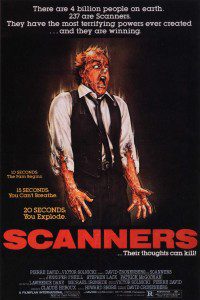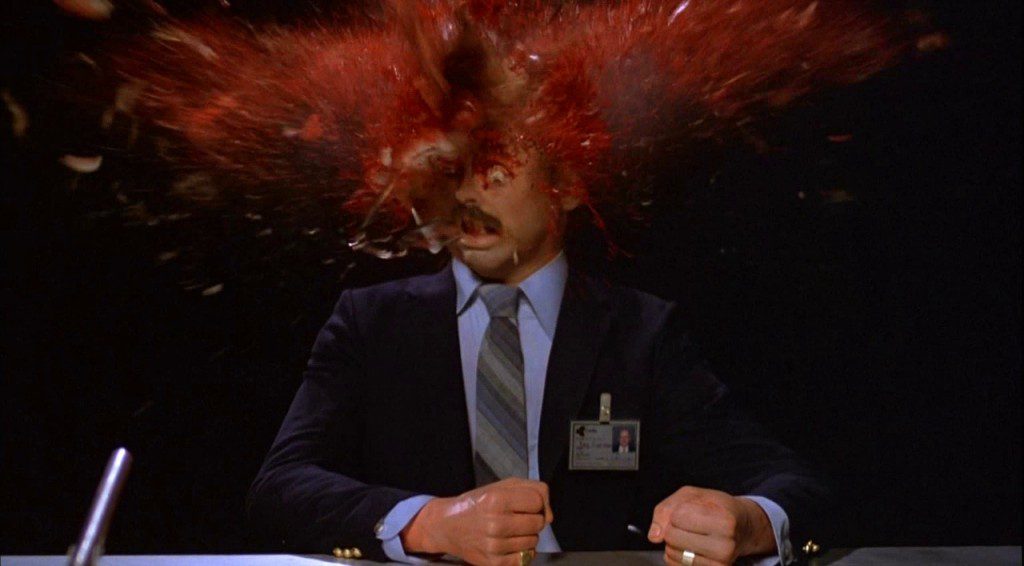

The late seventies had seen a number of films involving telekinesis, most notably: Carrie, The Fury (both from Brian De Palma), the Aussie shocker Patrick, and The Medusa Touch. It must have seemed that Cronenberg’s Scanners, arriving a few years later, was a little late to the party. But arriving when it did meant it was perfectly placed to benefit from the burgeoning home video market.
Cronenberg continues a theme established in his earlier films of scientists manipulating the human body and the consequences of such interference, though here he eschews the body horror of disease, infection and birth that informed his earlier work.
Looking at it now the premise could be for an X-Men film. After an incident at a shopping mall, a troubled drifter, Cameron Vale (played by Stephen Lack), is taken into the care of scientist Paul Ruth (Patrick McGoohan). Vale, it turns out, is a scanner – someone who can read and manipulate the minds of all those around them. The good doctor introduces Vale to the organisation ConSec and tells him that he can stop the incessant barrage of voices, but first he requires Vale to infiltrate a rival group of scanners led by the psychotic Darryl Revok (a career defining role for Michael Ironside).
For the most part Scanners plays like a conventional thriller. It’s this reliance on the conventional that make the set pieces the film is best known for all the more powerful. In fact anyone coming to it expecting wall-to-wall heading popping mayhem may leave disappointed, as Cronenberg keeps a tight reign on the gore. For the most part, a scanners greatest skill seems to involve staring maniacally, forcing others to do things against their will and generally messing with heads. Not necessarily taking them apart. When that head explodes, and it happens quite early on in the proceedings, it is all the more shocking because of what we think we’ve already come to know and expect from the film. The film’s most memorable scene is brilliantly conceived, as Cronenberg ratchets the tension up to unbearable levels. Even when you know what’s coming, and everybody does these days, it’s still quite shocking. Not even the pyrotechnics on display during the final confrontation come close.
Still, the film is not without some faults. Some of the action scenes (particularly the shoot-outs) are unintentionally comic – action has never been Cronenberg’s strongest suit. The dialogue is overly expositional, especially towards the end with only an old pro like McGoohan able to manage the lines with any real conviction. There’s also a bit in the film where Vale finds that he can ‘scan’ ConSec’s computer system – over the phone, no less – that feels like a plot contrivance too far. The resulting scene, where the lab technicians have to set the computer to self-destruct in order to stop him is ridiculous. Why can’t someone just unplug the modem?
The main character development is also something of a problem. Vale’s transition from hopeless vagrant to resourceful hero is almost instantaneous. Though I suppose a Rocky-style montage of him getting his shit (and head) together would have been out of the question.
The quality of the acting is in keeping with previous Cronenberg outings. Variable. All the lead actors are fine. Jennifer O’Neill as a member of a scanner underground group is given very little to do, other than tag along. McGoohan as the shambolic, yet slightly sinister Doctor Ruth, gives the film a sense of authority. As Vale, Stephen Lack retains a sense of detachment throughout. His character is described in the film itself as having no real personality of his own – he certainly achieves this. Whether through accident or design it’s hard to say. But, in the end, it’s Ironside’s film. It’s his likeness on the film posters and he dominates every scene he has. He’s the polar opposite to Lack in every aspect. Lack’s appearance with his soulful blue eyes is no match for Ironside’s dark intense stare. There’s a scene involving archive film footage of him being interviewed after trepanning his own skull. In it he resembles a young Jack Nicholson.
There is also sterling work from make up effects legend Dick Smith and Cronenberg’s regular composer, Howard Shore, whose sweeping orchestral score brings a real sense of class to the proceedings (much like Brian May’s score achieved with Mad Max).
For a film made over thirty years ago it still holds up well today. The parts that made such a big impression back then have in no way been diminished by the passage of time. Perhaps buoyed up by the film’s critical and commercial reception, the human psyche was to remain the source of interest for Cronenberg’s next feature. The peerless Videodrome.
NEIL WILLIAMS
Second opinion
Scanners, David Cronenberg’s seventh film, followed on from The Brood; oddly, it’s a more uneven and less accomplished film, but still one with real power.
Cameron Vale (Lack) is a ‘scanner’ – one of a rare group of people with powerful telepathic abilities. His inability to understand or control those abilities has reduced him to a wreck, a derelict, his head filled with the internal voices of others. At that point, he’s recruited/kidnapped by Dr Paul Ruth (McGoohan), who has been attempting to recruit and train scanners for the ConSec corporation. Ruth helps train Cameron to control his powers, and then sends him out into the world to locate the network of scanners led by the megalomaniacal Darryl Revok (Ironside.) Instead, Cameron finds a peaceable and harmonious scanner collective led by Kim Obrist (O’Neill), but Revok’s shotgun-wielding agents locate them and wipe out the group except for Kim and Cameron. Meanwhile, Revok is working with Keller (Dane) ConSec’s corrupt and ruthless head of security. When Cameron brings Kim back to meet Dr Ruth at ConSec, he finds himself walking into the lion’s den. Moreover, the truth about the origin of the scanners, and the nature of Revok’s plans, is beyond anything Cameron could have feared or imagined.
The film is pacey and punchy, shot with great impudence, but is far more a straightforward thriller than its predecessor, lacking The Brood’s emotional depth and relying more heavily on action scenes and special effects – provided here by the ever-reliable Dick Smith (American Werewolf in London). The famous ‘exploding head’ sequence is still shockingly effective, but the gruesome effects in the climactic ‘scanner duel’ have aged a little less well.
Probably the film’s biggest handicap is its lead actor, Stephen Lack. Presumably his full name should read Stephen Lackofanydiscernibleactingabilitywhatsoever. The man is, sadly, a block of wood. In a way, that isn’t a problem for the first half or so of the film, where Cameron is still something of a naïf, his personality unformed because his head’s been full of other people’s clamouring voices. He is, initially, childlike, but like any child has a capacity for cruelty. This is shown in a scene where he trains with a yoga master, and again when he probes an art dealer with the rather wonderful name of Arno Crostic (Adam Ludwig) for information – but in the second half, where his character grows fuller and more rounded, Lack’s flat, reading-from-an-autocue performance becomes truly wince-worthy.
Happily, Cronenberg has always been a director who can gather a strong cast (what the hell happened with Lack is anyone’s guess, but everyone has the odd misfire) and he does the best thing that can be done in such a situation; surround the wooden leading man with a supporting cast who can do the acting for him. O’Neill is fine in her role, though she’s sadly underdeveloped and underused; McGoohan, grey-haired, bearded and deep-voiced, has the air of an Old Testament patriarch, if not the biblical Jehovah himself, both the rumpled academic and clinical doctor. Alternating between the coldly controlling and the warmly paternalistic, he plays Paul Ruth with an ambiguity that serves both film and performance well, up till his final mental collapse.
Michael Ironside is, as ever, superb. During the 80s, he was the go-to guy if you wanted a broody villain (or a suitably dark anti-hero, as in the US miniseries V). His performance as Revok is one of quiet, feline malevolence, with pure psychosis simmering underneath. Lawrence Dane is coldly menacing and vicious as the corrupt Keller. Robert Silverman, as the troubled artist Ben Pierce, is weird, driven and enjoyably OTT, but like the film as a whole, it’s something of a comedown after his performance in The Brood. Similarly, Howard Shore’s electronic score is effective enough, though as the film progresses, it’s laid on so heavily that it starts to cloy, in stark contrast to his soundtrack to the earlier film.
Scanners didn’t have the happiest of production histories. Perhaps that’s why, while an original and inventive blend of the sci-fi, thriller and the horror genres, and effective enough in execution, it’s something of a retrograde step in comparison to The Brood (seeing the two as part of a double bill only underlines the shortfall.) Even so, one sub-par Cronenberg is still worth several efforts by most other directors, so for all its failings, it’s worth a watch.
SIMON BESTWICK
Second Sight’s Blu-ray release features the following extras:
- My Art Keeps Me Sane: Interview with Stephen Lack
- The Eye of Scanners: Interview with Cinematographer Mark Irwin
- The Chaos of Scanners: Interview with Executive Producer Pierre David
- Exploding Brains & Popping Veins: Interview with Makeup Effects Artist Stephen Dupuis
- Bad Guy Dane: Interview with Actor Lawrence Dane
Extra Info
Director: David Cronenberg
Starring: Patrick McGoohan, Stephen Lack, Jennifer O’Neill, Michael Ironside
Certificate: 18
Running time: 103 minutes
Blu-ray release: 8 April 2013
If you enjoyed our review and want to watch Scanners, please consider clicking through to our Amazon Affiliate links. If you do you’ll help keep the This Is Horror ship afloat with some very welcome remuneration.

